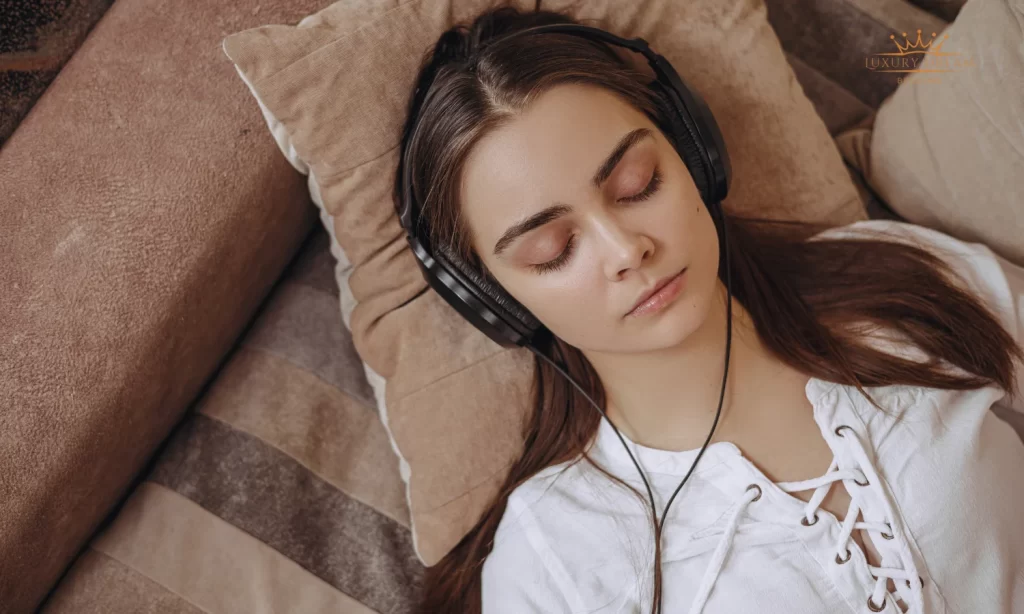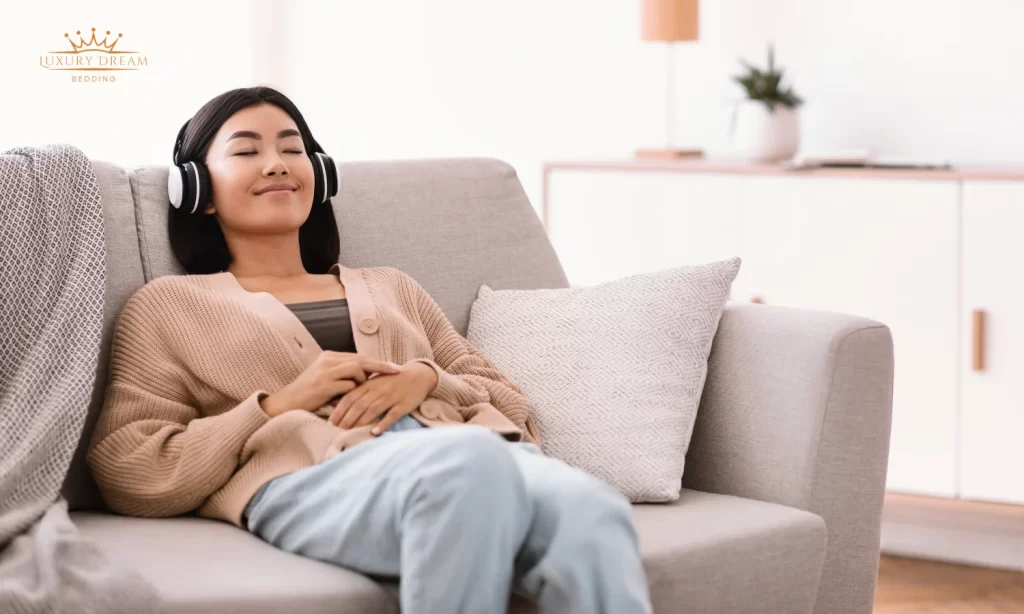In today’s fast-paced world, quality sleep has become a luxury that many struggle to attain. With increasing stress and screen time, falling and staying asleep can feel like a nightly battle. Among natural remedies, meditation music for better sleep is emerging as a gentle, drug-free solution. But does it truly deliver the deep, restful sleep we crave—or could there be hidden side effects we should be aware of?
In this article, we’ll explore how meditation music can help you sleep better, what potential downsides to consider, and how to make the most of it for truly restorative nights.
I. What is meditation music?

Meditation music is a genre specifically designed to promote relaxation, mindfulness, and inner peace. When used for sleep, meditation music for better sleep typically features slow tempos, soothing tones, and nature sounds like flowing water, rustling leaves, or birdsong. Its purpose is to calm the mind, regulate breathing and heart rate, and gently guide the listener into a state of deep rest.
Unlike typical background music, meditation music is crafted to positively impact the nervous system, helping to ease stress and support mental stillness. For those seeking a natural way to fall asleep without medication, it’s a compelling option.
II. Key benefits of listening to meditation music for better sleep
Listening to meditation music for better sleep goes beyond simple relaxation—it can deliver profound mental and physical health benefits. Here are the top advantages:
1. Reduces stress and anxiety
Meditation music calms the sympathetic nervous system, reducing stress hormones and quieting the mental chatter that keeps you awake. Its gentle rhythms help you let go of daily worries and ease into sleep more peacefully.
2. Improves sleep quality

The slow, steady tempo of meditation music helps synchronize your breath and heartbeat, promoting a state of deep relaxation. This not only helps you fall asleep faster but also improves sleep continuity and depth.
3. Aids in managing insomnia
For individuals dealing with chronic sleeplessness or nighttime restlessness, meditation music for better sleep offers a natural and non-addictive alternative to sleeping pills. It’s a safe practice that can support long-term improvements in sleep patterns.
4. Enhances mental well-being
Regularly listening to meditation music can improve mood, lower symptoms of depression and anxiety, and promote a more positive mindset—so you don’t just sleep better, you also wake up feeling refreshed and emotionally balanced.
III. Are there any side effects of listening to meditation music for better sleep?
While meditation music for better sleep is generally safe and beneficial, improper use may lead to a few unintended effects. Here’s what to watch out for:
1. Hearing issues
Listening at high volumes—especially with headphones—for extended periods can strain your ears and potentially damage hearing. If you play music throughout the night, be sure to keep the volume low and avoid prolonged headphone use.
2. Dependency

Some individuals become so accustomed to falling asleep with meditation music that they struggle to sleep without it. While not harmful, this dependency can be inconvenient during travel or power outages.
3. Incompatible music choices
Not all meditation music works for everyone. Some tracks may include jarring sounds, unusual frequencies, or rhythms that disturb rather than soothe. It may take a bit of trial and error to find what genuinely works for your mind and body.
4. Disruptive noise
If played through external speakers, especially at night, meditation music can unintentionally disturb your partner or housemates. In small spaces, even subtle sounds can echo and disrupt sleep for others.
IV. How to use meditation music for better sleep effectively
To fully benefit from meditation music for better sleep while minimizing side effects, consider these expert tips:
1. Choose the right tracks
Look for instrumental, lyric-free music with slow rhythms and natural ambient sounds. Platforms like YouTube, Spotify, or meditation apps offer a wide selection—experiment until you find what calms your mind best.
2. Control the volume
Keep the volume low—just loud enough to be heard. If using headphones, choose ones with noise-canceling features and never exceed 60% of your device’s maximum volume.

3. Use a sleep timer
Avoid letting music play all night. Use your device’s sleep timer to stop playback after 30 to 60 minutes, once you’re in deep sleep. This preserves battery life and prevents overstimulation.
4. Pair with a relaxation routine
Combine meditation music with pre-sleep rituals like deep breathing, short mindfulness meditations, or gentle stretches. This enhances the calming effect and prepares both body and mind for rest.
5. Optimize your sleep environment
A quiet, dark, and cool bedroom enhances the impact of meditation music. Limit screen exposure before bed and create a sleep-friendly atmosphere with soft lighting and a comfortable mattress.
Final tips for safe and effective use
To get the best results from meditation music for better sleep, keep these additional points in mind:
- Don’t over-rely on it: While effective, music should be one part of a holistic sleep routine. Maintain a healthy diet, regular exercise, and consistent bedtime schedule.
- Consult a professional: If you suffer from prolonged insomnia or suspect underlying health issues, talk to a doctor or sleep specialist.
- Keep it fresh: Rotate your playlist occasionally to prevent boredom and maintain the emotional impact of the music.
Meditation music for better sleep is a powerful, natural tool to enhance your nightly rest, reduce stress, and boost your mental wellness. But like any tool, it works best when used with intention and care. By following the strategies outlined in this article, you can transform bedtime into a calming ritual and wake up feeling truly restored.
Ready to reclaim your nights? Try a meditation track tonight—and let peace guide you to better sleep.
